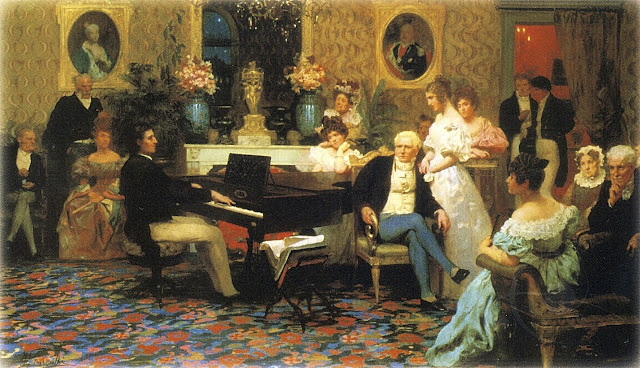So late at night but enthusiasm has taken over tact. A few rough notes!
I have been listening to the new Alexei Lubimov CD recorded on the 1843 Pleyel pianino Serial No: 10112 by that Polish genius of sound recording, Lech
Dudzic and Gabriela Blicharz. The instrument was restored and donated to the National Fryderyk Chopin Institute in 2018 by the pianist Alex Szilasi. The notes on the instrument that accompany the disc are fascinating and written by the renowned Polish authority on period pianos, Benjamin Vogel.
It is absolutely wonderful..... the sound of this instrument is intimate, varied in
seductive sound coloration, a delicacy that touches the sensibility in an
utterly unique manner. Pianissimo is barely there like wraith drifting across
the room.
The polyphony of the Bach is astonishingly beautiful and
the fugal voices so clear and transparent. Ravishingly eloquent.
The Barcarolle is remarkable as the instrument limits the
dynamic range possible, avoiding the crazy exaggerations that a Steinway,
Fazioli or Yamaha permits some pianists. Just the rise and fall of agitated
lover’s emotions ....... a revelation in embracing the much lower relative dynamics he was accustomed to .... the intimate poetry, timbre and colours
possible.
The Adagio of the Beethoven 'Moonlight' Sonata is divine .... the colour
spectrum and clarity of each singing voice is a revelation. The Allegretto has
the innocence of childhood. The Presto does not overwhelm with passion but
expresses the soulful emotional agitation of the heart.
The fiotituras in the Berceuse are like Venetian lace in
delicacy ..... the upper register ‘piano’ dynamic and fragility is exquisite.
The variations wander about with such intimacy ..... like a true recreation in
time .....
 |
1843 Pleyel pianino Serial No: 10112
|
| My own Pleyel pianino of 1844 Serial No: 11151 |
Bellini, Mme. Sand, Pauline Viardot, Delacroix, the cellist Auguste Franchomme, and Balzac's Polish mistress later wife Mme. Hanska all owned these superb pianino instruments. This is the type of instrument Chopin had sent to Valdemossa. Of course one cannot build a concert career on such an instrument but one can learn something of the intimacy that Chopin, unlike Liszt ('I play to the galleries!'), strove to achieve in performance.
If you have read my Internet Notebook or my
book on Poland you know David Winston of the Period Piano Company carefully restored my Pleyel pianino, retaining as any original parts as possible and restringing the instrument. This has shed remarkable light on the performance of the music of Fryderyk
Chopin (particularly from the Polish National Edition of his work edited by Jan
Ekier) and has simply been a musical revelation for me. The great Chopin scholar and Cambridge Professor, John Rink, also purchased a Pleyel pianino from David Winston and is so happy.

Detail from the famous picture Chopin's Polonaise - A Ball at the Hôtel Lambert in Paris by Teofil Kwiatkowski now in the National Museum Poznan.
This palace (the Hôtel Lambert) was the Parisian home of the Polish magnate Prince Adam Jerzy Czartoryski and a centre for the volatile discussions of the 'Polish question' in the mid nineteenth century. There was an annual Polish Ball and Chopin is seen playing a small Pleyel instrument when the artist could easily have depicted him seated at a far grander instrument. These instruments were not played against a wall as uprights are today but wheeled into the open area of a drawing room thus freeing their marvellous sound. They were customarily equipped with ormolu handles on either side of the case and castors for the purpose.
The Lubimov CD is available from the National Fryderyk Chopin Institute Shop
More on David Winston:







Comments
Post a Comment